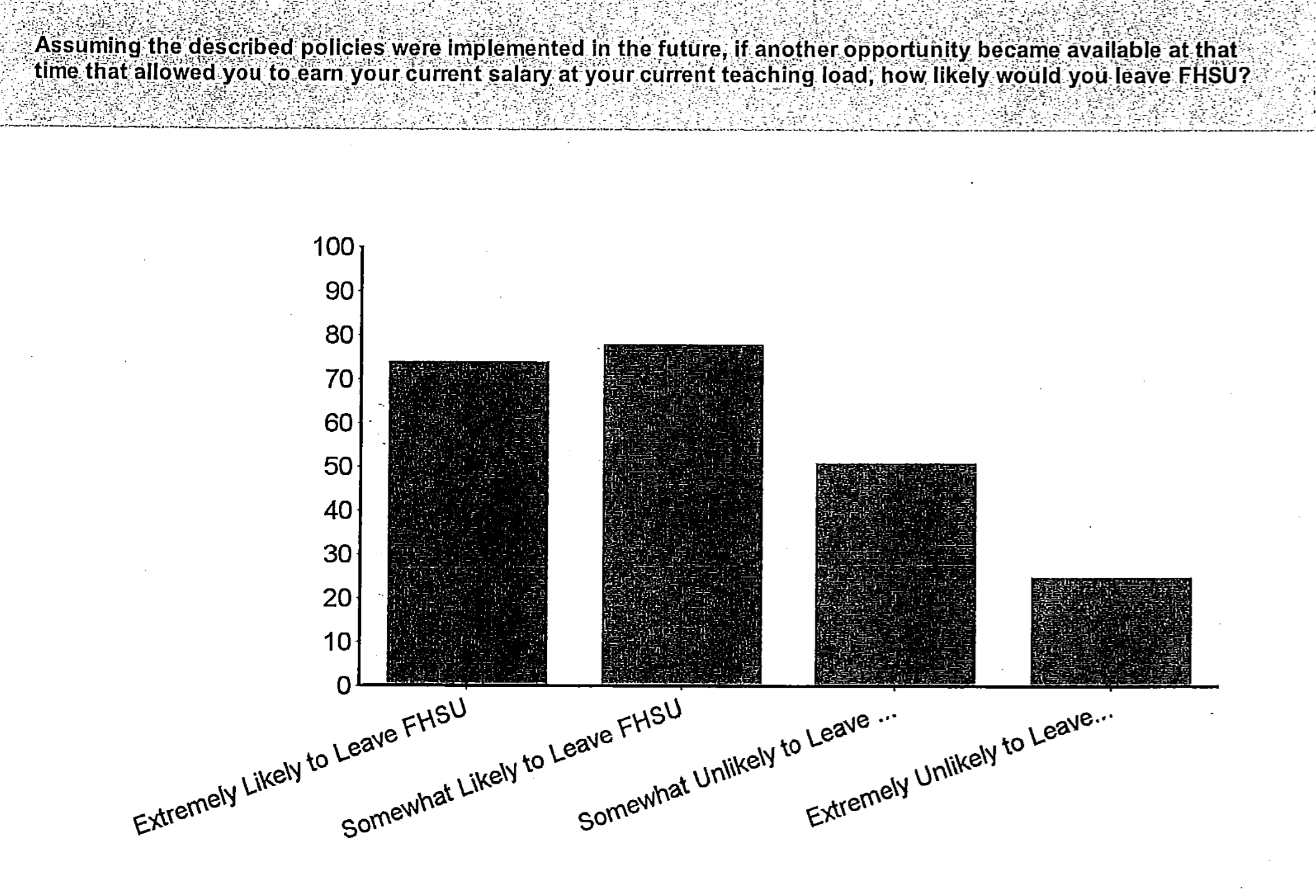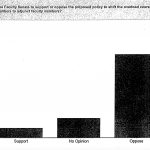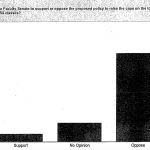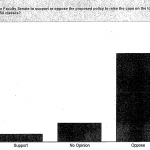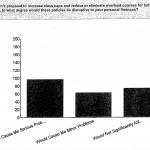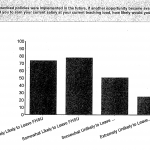By GARRETT SAGER
Hays Post
Lost in the confusion at Fort Hays State University that followed the resignation of Dr. Mirta Martin from her post as president is a survey sent out to many of the faculty and staff at FHSU — a survey that may of played some role in her departure.
Since pieces of it were used to demonstrate dissatisfaction in Martin’s leadership at a October meeting with the Kansas Board of Regents, the survey, which was delivered to Hays Post by an anonymous FHSU employee, since has been shut down by an internal panel and a gag order has been placed on discussing its contents.
Dr. Carl Miller, FHSU Faculty Senate president and associate professor in the philosophy department, said he used the meeting with the Regents as an opportunity to “alert the board that we were aware of some troubling information about the administration.”
In November, the Institutional Review Board at FHSU ordered all copies of the unredacted and redacted survey and data it contained be destroyed.
But the survey played an instrumental role in the controversy leading up to Martin’s resignation on Nov. 23. During that October Faculty Senate meeting, Miller told the Regents the survey showed a “broad range of discontent” among faculty and staff.
Miller told the Regents the Senate had conducted a survey, and it said that 66 percent of the respondents indicated they would be likely to leave FHSU if they could find another job.
But that interpretation lacked context, according to the senator assigned to conduct it. Dr. Gary Brinker heads up the university’s Docking Institute, but was acting in his role of faculty senator during the investigation.
The survey given out to faculty members in October only covered Martin’s proposed change to the caps and overloads policy and how the policy would affect the individual faculty members from a personal and financial perspective. The survey was not intended to seek opinions on Martin’s overall competency as president, Brinker contends.
RELATED: Regents expected to name interim president this week.
The Faculty Senate would reject the proposal of caps and overloads and pass a resolution that the university wait to implement until at least the fall of 2017.
In the 56-page document given to Hays Post, faculty members were asked to answer six questions — all of which dealt with a proposed change to the FHSU caps and overloads policy — and then provide personal testimony to why they answered the way they did.
Brinker, a professor in the sociology department, said that, based on the information presented, there have been many false conclusions made about the survey’s findings.
“They’ve absolutely been misrepresented. It’s been falsely misinterpreted, in my opinion” Brinker said. “When you interpret survey results, the context is very important.”
The data Miller used originates from the survey, but the question presented in the survey was: “Assuming the described policies (caps and overloads) were implemented in the future, if any opportunity became available at that time that allowed you to earn your current salary at your current teaching load, how likely would you leave FHSU?”
Miller said he was misquoted in early media reports and that he tried his best to explain to the Regents it was only if the polices were implemented that the faculty would consider leaving.
“I tried very hard to not make the statement that two-thirds of people are looking for work,” Miller said.
Brinker denied that Miller made any attempt in explaining the findings of the survey to the KBOR.
While Miller says he was misquoted, he still believes the 66 percent figure reflected negatively on Martin’s leadership.
The data shows 32.46 percent said they were extremely likely to leave FHSU if the caps and overloads policy was changed, while 34.21 percent said somewhat likely to leave FHSU. The proposed change to the caps and overloads policy would transfer teaching duties to overload classes to adjuncts, which would have meant a loss of income for professors currently teaching those classes.
The data presented to KBOR and reported in the local media was out of context, Brinker said.
“To interpret survey results, you have to give all the context that was given to the respondent when you are interpreting it, or it can be misleading,” he said.
Brinker could not comment specifically how the data was misinterpreted, as it would be a violation of the gag order on the survey.
“I believe I cannot do that because, in order to do that, I would have to refer to the results of the survey. But I will say that anyone who has a copy of that report can read it, and you don’t have to be a rocket scientist to interpret the degree in which it does not provide support for the allegations against Martin,” Brinker said.
Click HERE to view the survey, including comments.
According to Miller there’s been no false interpretations of the survey, adding the KBOR is in possession of the survey.
“If I misrepresented the data, I would then be misrepresenting something I then gave to the Regents,” he said. “They are in possession of it. For me to say something that the survey does not show would be foolish, and I would lose all credibility.”
Miller said he urged the Regents to read the comments section, which he said showed widespread dissatisfaction with Martin.
“I told the board that there was 50 pages of comments that showed dissatisfaction and that they can read them and characterize them for what they are,” he said.
Miller said the comments section does support the notion of a broad range of discontent and dissatisfaction with Martin.
“I’m not sure how you can look at the comments and say that they are overwhelmingly positive like Dr. Brinker believes,” Miller said. “The comment section expresses everything that has been said to me in my discussions with department chairs and various other faculty members that they are displeased with Martin’s leadership.”
The IRB held a special meeting just before Martin’s resignation to discuss the survey. In the short meeting, according to Brinker, IRB panelists asked him if he believed the subjects were harmed, and Brinker said they were not.
Following that meeting, Brinker said he was left with the impression that he IRB would allow him to clarify misinterpretations presented to KBOR, but the opposite turned out to be true.
“I was shocked,” Brinker said. “At the time, I had no idea that President Miller intended to use the study in the way that he did. … The whole purpose of the IRB is to protect the human subjects of my study and they weren’t in danger until the embargo because now the public believes that this survey shows widespread dissatisfaction with Martin, and all these faculty members wanted President Martin fired. If this survey provides no evidence of malfeasances or negative behavior of President Martin, by suppressing that information, you are damaging all these faculty members.”
Brinker thought Miller would use the survey internally to show the Senate whether the faculty did or did not support the a change to the caps and overloads policy.
“I was totally shocked when he (Miller) cited the survey supporting widespread dissatisfaction with President Martin,” Brinker said.
Miller does not recall making any statements of how the survey specifically shows widespread dissatisfaction.
“I tried to be as narrow as possible in presenting the survey. It simply did not show dissatisfaction with Martin’s presidency because that’s just not how it was devised. But, in the comments if you read them, that is where you find the widespread dissatisfaction,” Miller said.
Although he came up with the questions for the survey, Brinker said he suspects the survey was devised to be a tool that would be used in a campaign to smear Martin.
“It appears that’s what it was used for, and I can only assume that’s how it was devised,” Brinker said. “The scope of how the survey was used was beyond what I thought it was going to be used for.”
Miller disagrees with Brinker’s comments and acknowledged the survey was not designed to discern general satisfaction with Martin and her leadership.
“I tried not to use it in that way,” Miller said. “I tried to use it very specifically for the two policies and show that faculty did not support the policies. It did not measure a general dislike.”
Brinker recently resigned from the Faculty Senate because the Senate did not object to how Miller presented the survey.
“I was very upset with what President Miller did,” Brinker said. “He basically used his position as president as a bully pulpit.”
KBOR has acknowledged that they did receive Brinker’s email expressing how the content of the survey was misrepresented by certain individuals at the October meeting. However, KBOR declined to comment on the specific findings in the survey or if they played a role in Martin’s departure.
Because of the nature of the survey, Miller does not believe that the survey played any role in KBOR’s investigation into Martin and could not even say with complete certainty that the Regents even looked at the survey.
“In the end, it had nothing to do with her leaving. It had zero importance,” he said. “The board had it, but they didn’t make any decisions on the survey and she didn’t resign because of the survey. At most, the survey is embarrassing to her. All the survey shows is that faculty were not satisfied with the policies and the comments do take jabs at her, but our letters to the boards meant more than this survey.”
What the survey does show
The survey shows the faculty largely opposed the Martin’s proposals to increase the cap size to 50 students per class and overloads.
The survey showed 76.52 percent of the faculty opposed the policy to raise the cap size of the classes and showed 73.80 percent of the faculty opposed the policy to shift overload classes to adjuncts.
In the narrative comments section of the survey, several faculty members said the policy of shifting overloads away from full-time faculty to adjuncts would affect them financially because they have “become accustomed to the pay” and because of a lack of base wage increases in recent years. Most of the narrative comments spoke directly to the question of the caps and overloads policy, although some faculty members did express frustration with the addition of new administrative overhead put in place by Martin.
According to the survey, 41.45 percent of faculty said if the overload policy was implemented it would cause “serious problems” to their personal finances, while 26.92 percent cited “minor problems,” and 31.62 percent said it would not significantly affect their personal finances.
Furthermore, the faculty cited that the quality of education would affect the students greatly if the two policies were passed because adjuncts are not as qualified as full-time faculty. Some said adjuncts are not as “invested” in the university as full-time faculty.
Other faculty members pointed the increase of caps decreasing the quality of education for students because of the extra time it would take to grade the work of the students, adding the larger student-to-professor ratio would limit the number of students they would be able to help.
Many faculty members said their salary is well under the national average for someone with their qualifications and to ask them to do more work with no pay increase would be wrong.
Why was the survey shut down?
Before the gag order, Brinker was not aware the IRB had the authority to shut down a survey.
“I was not aware the IRB had the kind of power to do a thing like that,” Brinker said. “I have absolutely have never had the IRB have issues with my research before, and I have been teaching for 25 years.”
In an email sent to Hays Post by Dr. John Raccke, chairman of the Justice Department and chairman of the IRB, he said the IRB followed FHSU IRB Policies and Procedures, which were approved March 10 by the university, stating the survey met all three of the criteria to be deemed a unanticipated problem.
Those factors included: “unexpected (in terms of nature, severity, or frequency) given (a) the research procedures that are described in the protocol-related documents, such as the IRB-approved research protocol and informed consent document; and (b) the characteristics of the subject population being studied; related or possibly related to participation in the research (in this guidance document, possibly related means there is a reasonable possibility that the incident, experience, or outcome may have been caused by the procedures involved in the research); and suggests that the research places subjects or others at a greater risk of harm (including physical, psychological, economic, or social harm) than was previously known or recognized.”
The IRB determined the survey caused a situation that has the potential for adverse effects of psychological and financial harm.
The IRB also cited a conflict of interest by Brinker because, as director of the Docking Institute, he answers directly to the university president.
Brinker denied the conflict of interest because he said he was acting as a faculty member when creating the survey and simply used Docking Institute software because it was convenient.
“I only work half-time as the Docking director. The other half, I am a faculty member in the department of sociology,” he said. “I was the faculty representative, and I did my role as a faculty member in conducting the survey.”
Miller has since apologized for the way he presented the survey by calling it a Docking survey.
“I initially said the survey was created by the Docking Institute,” he said. “I was wrong. It was created by Gary Brinker and not through the Docking Institute and I have since corrected that. I did not intend to give it false authority. I was not aware that there was a distinction.”
Brinker said he attempted to make the point of acting as a faculty member to both the IRB and Regents, with whom he was able to share how he assessed the misinterpretation.
“Before the embargo, I was able to scrutinize the survey, and I did send KBOR my assessment to the degree on how the assertions of President Miller were misrepresented,” Brinker said.
The conflict of interest is pointed in the wrong direction, said Brinker, who believes the IRB and members of the Faculty Senate had a conflict on interest because members of both teach overload classes.
“In my mind, anyone on the IRB who teaches overloads should have excused themselves from decision. Is that not a conflict of interest?” Brinker asked. “My concerns have been left unanswered. The IRB is damaging, which is why I believe they are being driven by self interest.”
According to an online listing of classes taught, many members of the Faculty Senate and IRB do indeed teach overload classes. Some members of the faculty would have lost thousands of dollars in wages if Martin’s proposed overload policy was implemented, a fear referenced frequently in the comments portion of the survey.
Typical class load for a professor at FHSU is four classes, or 12 hours. According to a faculty search, 20 of the 44 teach overload classes. Two of the eight IRB members teach overload classes.
“What I see is an unusually high number of courses taught by the faculty senators, including two members of the IRB,” Brinker said. “This is a strong indication of a conflict of interest.”
About two-thirds of faculty at FHSU teach overload classes, and the survey showed about 68 percent of the participants in the survey teach overload classes with ranges from one to seven or more, according to the survey.
“Im not sure you could find a Faculty Senate member that did not teach overloads because most faculty do,” Miller said. “It’s almost unavoidable.”
Not all overloads are paid, however, as it does not take into consideration the independent classes.
Independent classes are classes that show they are being taught by a chair of a certain department, but in fact the chair is just the instructor on record and the duties of teaching are completed by another professor who then provides the grade to the chair.
For example, Raacke, who is the chair of the Justice Department and one of the IRB members teaching overload classes, is listed as teaching seven overload classes, but only gets paid for two of the classes.
“There’s false conclusions on the overloads. Some have these big numbers and you are led to believe that they are making large sums of money off these overloads, but that is just not true,” Miller said.
